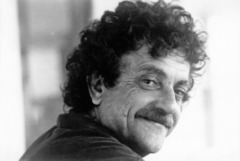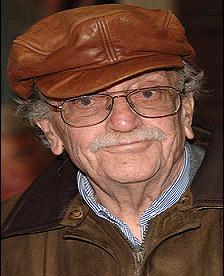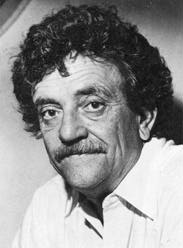 | April 12, 2007 - Good Bye, Kurt Vonnegut |
|
|
|
|
He was 84 years old. He sustained a bad fall a few weeks ago and sustained brain injuries.More important is that a voice has been stilled. The well known humanist (The American Humanist Association (AHA) is an educational organization in the United States that advances Humanism)and humorist became the voice of conscience. His anti-war stance was well known, his views forged by his experience of the bombing of Dresden and as a prisoner of war at the end of World War II. Equal parts absurd, horrifying and funny, his novels resonated with the generation that next faced the war in Vietnam.
In recent years, Vonnegut was an outspoken critic of the current administration. Never politically correct, he always spoke his mind.
Sad that he is dead. Tragic that such a voice is stilled.
Good-bye, Mr. Vonnegut.- http://riannanworld.typepad.com/my_weblog/literature/index.html
Counterculture author, icon Kurt Vonnegut Jr. dies at 84
By Mark Feeney, Globe Staff | April 12, 2007
Kurt Vonnegut Jr., whose blend of absurdist humor, science fiction, and antiestablishment politics made his novels "Slaughterhouse-Five" and "Cat''s Cradle" campus classics in the ''60s and ''70s, died last night in Manhattan. He was 84.
Breaking News Alerts Mr. Vonnegut had suffered brain injuries after a fall at his Manhattan home weeks ago, his wife, photographer Jill Krementz, told the Associated Press.
As much as his books, Mr. Vonnegut''s distinctive appearance -- bushy hair, thick mustache, and sad, quizzical eyes -- contributed to his iconic status. He had the look, as well as much of the dark outlook, of a latter-day Mark Twain.
Mr. Vonnegut''s best-known work, "Slaughterhouse-Five" (1969), drew on his experience as a prisoner of war at the end of World War II. Like Mr. Vonnegut, Billy Pilgrim, the novel''s hero, survives the fire-bombing of Dresden by Allied forces in February 1945. Billy then travels to another planet, Tralfamadore, where he is able to see all time. "So it goes," the novel''s refrain, became a popular catchphrase, initially with protesters of the Vietnam War. Its combination of simplicity, irony, and rue is very much in the Vonnegut vein.
"He was sort of like nobody else," Gore Vidal told the Associated Press early this morning. "He was imaginative; our generation of writers didn''t go in for imagination very much. Literary realism was the general style. Those of us who came out of the war in the 1940s made it sort of the official American prose, and it was often a bit on the dull side.
"Kurt was never dull."
Born on Nov. 11, 1922, in Indianapolis, Mr. Vonnegut was educated in public schools there. His father, Kurt Sr., was an architect. His mother, Edith, came from a wealthy brewery family. She suffered from mental illness.
"When my mother went off her rocker late at night, the hatred and contempt she sprayed on my father, as gentle and innocent a man as ever lived, was without limit and pure, untainted by ideas or information," Mr. Vonnegut wrote. She committed suicide. Later in his life, Mr. Vonnegut would suffer from depression, including a severe bout after the publication and success of "Slaughterhouse-Five."
In 1940, Mr. Vonnegut entered Cornell University to study biochemistry. His interest in writing led him to journalism, and he became a columnist and editor of the school paper. "I was flunking everything by the middle of my junior year," he later recalled. "I was delighted to join the Army and go to war."
While serving as an infantry scout during the Battle of the Bulge, he was captured by the Germans and put to work in a Dresden factory.
In the sort of surreal detail that would often figure in his fiction, Mr. Vonnegut survived the bombing of the city only because he was on a work detail in a refrigerated meat locker three stories beneath the ground. Following the raids, Mr. Vonnegut was put to work retrieving bodies and removing valuables. "One hundred thirty thousand corpses were hidden underground," he noted once in an interview. "It was a terribly elaborate Easter-egg hunt."Continued...
After the war, he married a childhood friend, Jane Cox. The couple divorced in 1979. Mr. Vonnegut studied anthropology at the University of Chicago. His master''s thesis was rejected in 1947, but 24 years later the university granted him a degree in recognition of the "anthropological elements" in his novel "Cat''s Cradle" (1963)
From 1947 to 1950, Mr. Vonnegut worked as a publicist for General Electric in Schenectady, N.Y., while writing short stories in his spare time. The first to be published appeared in Collier''s in 1950. He moved to Cape Cod (Provincetown, later West Barnstable), taught high school English, worked with emotionally disturbed children, then managed the first Saab dealership in the nation.
He published more than 50 stories over the next 16 years.
His first three novels, "Player Piano" (1952), "The Sirens of Titan" (1959), and "Mother Night" (1962), drew little attention. "Cat''s Cradle," with its vision of a world destroyed by the freezing compound "Ice-9," drew praise from writers as diverse as Graham Greene and Jules Feiffer and helped establish Mr. Vonnegut''s reputation. In "God Bless You, Mr. Rosewater" (1965), Mr. Vonnegut introduced his alter ego, science fiction writer Kilgore Trout, who recurs in later novels.
Other novels by Mr. Vonnegut include "Breakfast of Champions" (1973), "Slapstick" (1976), "Jailbird" (1979), "Deadeye Dick" (1982), "Galapagos" (1985), "Bluebeard" (1987), and "Hocus Pocus" (1990). Several of his books were adapted for movies, including "Slaughterhouse-Five" in 1972 and "Mother Night" in 1996.
Counterculture Icon
WIKI about Kurt Vonnegut Jr.
Воннегут, Курт


